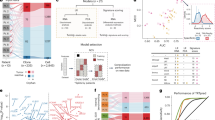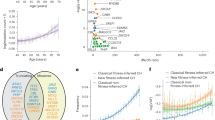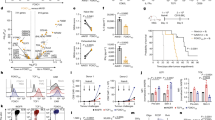Abstract
We have examined the expression of major histocompatibility complex (MHC) antigens, constitutive or induced with interferon gamma (IFN-gamma), in a line of C3H mouse embryo fibroblasts (C3H 201) transformed with a helper-virus-free preparation of the Kirsten strain of murine sarcoma virus. C3H 201 cells expressed some class I antigen (H-2Kk) in the absence of added interferon, unlike the parental C3H 10T1/2 cells from which they were derived. However, this declined with (in vitro) passage level after transformation. Treatment with IFN-gamma induced very high expression of H-2Kk at all passage levels. There was no constitutive expression of class II antigen (I-Ak); however, this could be induced by IFN-gamma. Inducibility of I-Ak was found also to be related to the number of passages after transformation; at early passage levels after transformation more I-Ak was induced than after the cells had been allowed to grow for several passages, until at high passage levels little or no I-Ak was induced. This was not due to the presence of a subpopulation of untransformed cells since when the cells were cloned shortly after infection all the resulting clones were transformed. In addition, IFN-gamma at any passage level induced clearly less I-Ak than was found in C3H 10T1/2 cells, in which I-Ak inducibility was high and stable. Twenty-one clones were derived from C3H 201 cells at early passage (less than 8) either from soft agar or from liquid culture. These clones showed a wide variation in MHC antigen phenotype. Many expressed H-2Kk in the absence of IFN-gamma, and all were strongly inducible for H-2Kk. None showed I-Ak in the absence of IFN-gamma. All but two expressed I-Ak after IFN-gamma treatment but, with four exceptions, clearly less than the untransformed line. Four clones derived at late passage (40) resembled the late passage line. The expression of the ras oncogene and tumorigenicity was studied in representative clones; there was no obvious correlation with MHC phenotype, nor with the method of cloning. We conclude from these studies that the expression of MHC antigens by fibroblasts expressing the v-Ki-ras oncogene, either with or without exposure to interferon gamma, is unstable, varying with the number of cell generations from transformation and from clone to clone.
This is a preview of subscription content, access via your institution
Access options
Subscribe to this journal
Receive 24 print issues and online access
$259.00 per year
only $10.79 per issue
Buy this article
- Purchase on Springer Link
- Instant access to full article PDF
Prices may be subject to local taxes which are calculated during checkout
Similar content being viewed by others
Author information
Authors and Affiliations
Rights and permissions
About this article
Cite this article
Morris, A., Ward, G. & Bateman, W. Instability of expression of major histocompatibility antigens in fibroblasts expressing activated ras oncogene: constitutive and interferon-gamma induced class I and class II antigens in a series of clonal isolates of murine fibroblasts transformed by v-Ki-ras. Br J Cancer 60, 211–215 (1989). https://doi.org/10.1038/bjc.1989.253
Issue Date:
DOI: https://doi.org/10.1038/bjc.1989.253



